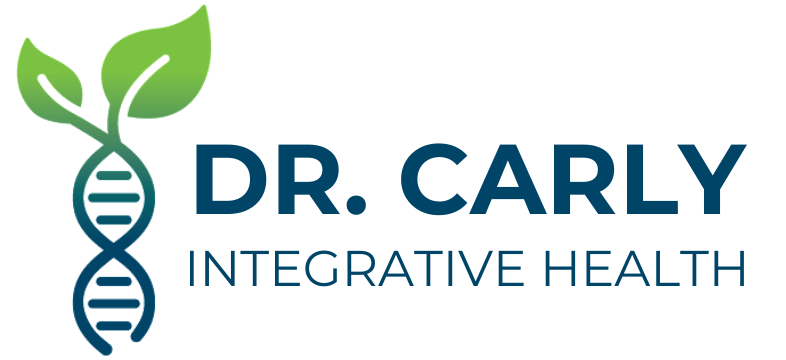How Estrogen and Progesterone Impact Your Thyroid Hormones
If you are like many women, managing your hypothyroidism has been difficult. Your thyroid medication hasn’t really made you feel better and you wonder if you really need to be on it for the rest of your life. You wonder why your thyroid is having trouble making enough hormones and what else might be going on in your body to explain everything.
If you wonder if your sex hormones may be playing a role, then you are right. Especially if you struggle with menstrual related symptoms. For women with non-autoimmune hypothyroidism, sex hormone and adrenal hormone imbalances may be either causing or exacerbating their hypothyroidism.
Estrogen and Thyroid Hormones
Estrogen is a goldilocks hormone. Too little or too much can cause huge problems. We need just the right amount. And this applies to how estrogen impacts the thyroid.
Estrogen stimulates thyroid growth. Too little estrogen may result in not enough thyroid tissue while too much could result in an enlarged thyroid gland.
Estrogen also stimulates the thyroid to make the thyroid hormone precursor, thyroglobulin. Too little estrogen may lead to not enough thyroid hormone precursor while too much could result in an enlarged thyroid due to high thyroglobulin.
Estrogen also increases the protein that carries thyroid hormones in the blood. If we have too much of this protein, then not enough thyroid hormones will be free and unbound to enter cells. This will lead to symptoms of hypothyroidism even if we have enough thyroid hormones.
Progesterone and Thyroid Hormones
Progesterone and thyroid hormones have a reciprocal relationship. You need adequate amounts of thyroid hormone for your ovaries to make progesterone but progesterone also helps the thyroid. For example, research shows that progesterone can increase thyroid hormone levels in the blood. Progesterone also decreases the amount of protein that carries thyroid in the blood so that more thyroid hormone can be free and get into the cells.
Case #1
A women in her late 20s complaining of fatigue, constipation, brain fog, and irregular cycles. Her previous doctor told her that her thyroid was normal because her TSH was less than 4 and offered her birth control pills for her irregular cycles.
On advanced testing, we found that her free T4 was under the lab reference range and her free T3 was at the very bottom of the lab reference range despite a TSH of 2. Her estrogen was normal, but her body spent a longer than usual time in the first phase of her cycle (long follicular phase). Her ovaries sometimes ovulated and sometimes didn’t, but even when she ovulated, her progesterone was low (side note, you have to ovulate to produce progesterone). We determined that her ovarian function was impaired due to high inflammation stemming from imbalances in her gut bacteria. We spent 6 months working on her microbiome. At the end of that time, her cycles had regulated and progesterone and thyroid hormones increased.
Case #2
A women in her early 40s with a diagnosis of hypothyroidism treated by Synthroid but still with complaints of fatigue, hair loss, brain fog, and depressed mood. Her cycles were regular but she experienced intense mood changes, breast tenderness and water retention before her period. Her previous doctor told her that she was just depressed and offered her an antidepressant.
On advanced testing, we discovered suboptimal free T3, high estrogen, low progesterone, low DHEA and imbalances in cortisol. Her progesterone levels for the cycle that we tested indicated that she did ovulate, but her ovarian follicles just weren’t producing optimal levels of progesterone. We determined that the high estrogen was due to detoxification and elimination issues. Stress and cortisol imbalances may have been impacting progesterone levels. After 9 months of treatment, her estrogen went down, her progesterone went up, her cortisol normalized and her thyroid hormones improved. She no longer experienced symptoms and we were able to decrease her thyroid medication.
Summary
Estrogen excess can inhibit proper functioning of thyroid hormones.
Progesterone deficiency can hinder the production and functioning of thyroid hormones.
Since estrogen excess and progesterone deficiency are hormonal imbalances that often occur together, your sex hormones can significantly impact your thyroid hormones. So if you are struggling with hypothyroidism and still have symptoms on medication, be sure to investigate your sex hormones.
Create a free account in my online supplement shop to receive 20% physician-grade supplements. Navigate to my favorites in the supplement catalog to find what supplements I use most for specific symptoms.
References
Santin AP, Furlanetto TW. Role of estrogen in thyroid function and growth regulation. J Thyroid Res. 2011;2011:875125. doi: 10.4061/2011/875125. Epub 2011 May 4. PMID: 21687614; PMCID: PMC3113168.
Ain KB, Refetoff S, Sarne DH, Murata Y. Effect of estrogen on the synthesis and secretion of thyroxine-binding globulin by a human hepatoma cell line, Hep G2. Mol Endocrinol. 1988 Apr;2(4):313-23. doi: 10.1210/mend-2-4-313. PMID: 2837662.
Datta M, Roy P, Banerjee J, Bhattacharya S. Thyroid hormone stimulates progesterone release from human luteal cells by generating a proteinaceous factor. J Endocrinol. 1998 Sep;158(3):319-25. doi: 10.1677/joe.0.1580319. PMID: 9846161.
Sathi P, Kalyan S, Hitchcock CL, Pudek M, Prior JC. Progesterone therapy increases free thyroxine levels--data from a randomized placebo-controlled 12-week hot flush trial. Clin Endocrinol (Oxf). 2013 Aug;79(2):282-7. doi: 10.1111/cen.12128. Epub 2013 May 6. PMID: 23252963.


